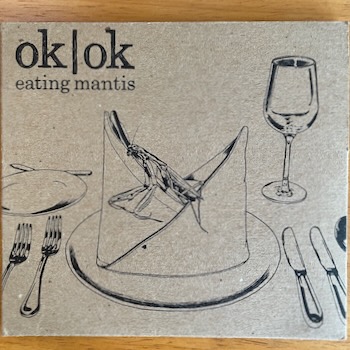Every so often, I hear about a label on our scene which would disappear, along with all the physical recordings. Horror stories abound, of label owners destroying CDs and LPs. Are the artists notified beforehand? Can the artists keep any of the copies about to be demolished? Unfortunately, the answer to both is often a “no”. Although the sound recording itself may belong to the artists, if the label produced the physical goods and helped distribute it, they often end up doing what they want with them. All we can do is sit on the sidelines. We often aren’t even given the chance to buy them back.
Thankfully, that is not what happened with ok|ok’s eating mantis which was recorded back in 2006, the year Spotify was born but hadn’t yet landed in the U.S., the “before times” when CDs still ruled. The album features Michael McGinnis, Khabu Doug Young, Tony Moreno and myself, and was released through a label back in 2008. We – the artists – produced the master recording ourselves and collectively own the sound recording. We also produced the artwork and did most of the publicity. The label produced the physical copies. Everything was very relaxed and we never had any formal agreement aside from the trust we had in each other. Friends making music, released by a label run by those we knew well. (I am still grateful to the label for giving us that opportunity.)
Somewhere along the way, things got reshuffled because of technological developments in the industry. CD sales plummeted, record stores went belly up and distributors disappeared. The label had personnel changes, then moved to a streaming/download only format, understandably presenting themselves outwardly as the rights holder of the music so they could deliver the audio files to various platforms.
Looking at the contracts I’ve worked on or signed since then, they almost always contain a blanket agreement which grants a label or artist to distribute the material on all future mediums that goes something like the this: “…grant all rights therein, including, without limitation, the following: any so-called “SACEM home video payment rights”, blank tape levies, cable transmission rights, and “Rental and Lending Rights” pursuant to laws, regulations or directives of any jurisdiction (collectively, “Collection Rights”), throughout the universe in perpetuity…”
That didn’t happen with eating mantis. All of us were unprepared for the speed of the transition. In hindsight, when the label went to digital distribution should have been the moment to hit the pause button, for the label and the artists to sit down. We never had a discussion with the label about digital streaming. (Four Tet’s royalty dispute lawsuit with Domino is a famous example of a “push for a fairer deal on historical contracts, written at a time when the music industry operated entirely differently.”)
Today, armed with the knowledge and experience of overseeing the label New Braxton House for over a decade, I am able to see what could have been done better from a business perspective to protect artists’ rights. Yet, surprising even myself, I’m not convinced those things are necessary. Our objective was to make great music together, label included. Having an airtight contract covering all possible future music technology was never the objective.
When did we turn into a society where negotiated agreement trumps all? Where we seem to spend so much time and money creating contracts? When did the objective switch from the common goal of creating something great together, based on trust and shared responsibility, to making sure all parties were covered legally should something go wrong? Of course, shared responsibility means that we all have to do the work, and that’s not always easy. But isn’t that better than tying each other up in the oft-incomprehensible fine print of legal jargon so that we end up being locked into a contract, rather than having the joy and flexibility of exploring solutions together? Isn’t it time we reexamined the status quo? (Full disclosure: I research the effect of trust vs. negotiated contracts; here is an excellent paper by Professor Marc A. Cohen The Crisis of Trust and Trustworthiness in Organization).
So here we are, 2023, the fifteenth anniversary of the album release. The artists collectively agreed that we should re-release the album on our respective outlets with the blessing of the label. Together, we are stronger. We – the artists – can no longer offer the physical CDs but we are very happy to be able to offer the digital album. Name your price. We just want people to listen to this album. I still love it. Bottom line, if we want to keep what we created, we need to own it. Negotiate carefully and always stand up for artists’ rights. Re-presenting eating mantis.
